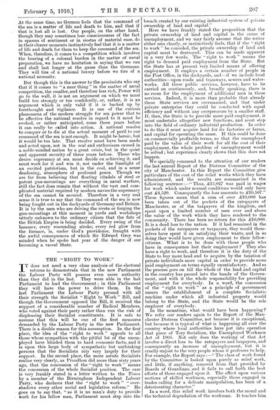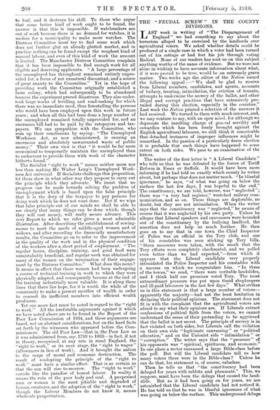THE "RIGHT TO WORK."
IT does not need a very close analysis of the electoral returns to demonstrate that in the new Parliament the Labour Party will possess even more authority than they did in the last. They were able in the last Parliament to lead the Government ; in this Parliament they will have the power to drive them. In the last Parliament the Labour Party pressed with all their strength the Socialist "Right to Work" Bill, and though the Government opposed the Bill, it received the support of a considerable number of Radical Members, who voted against their party rather than run the risk of displeasing their Socialist constituents. It is safe to assume that this will be one of the first measures demanded by the Labour Party in the new Parliament. There is a double reason for this assumption. In the first place, the idea of the "right to work" appeals to all those whose sympathies with the pitiful lot of the unem- ployed have blinded them to hard economic facts, and it is upon this large body of sympathetic but unthinking persons that the Socialists rely very largely for their support. In the second place, the more astute Socialists realise very clearly, as Proudhon did more than sixty years ago, that the concession of the "right to work" means the concession of the whole Socialist position. The case is very frankly stated in a letter written to the Times by a member of the Birmingham Independent Labour Party, who declares that the "right to work" "over- shadows every other social and legislative reform." He goes on to say that, "as it is no man's duty to provide work for his fellow man, Parliament must step into the breach created by our existing industrial system of private ownership of land and capital." Here we have frankly stated the proposition that the private ownership of land and capital is the cause of unemployment, and we may fairly assume that the writer either sees clearly, or instinctively feels, that if the "right to work" be conceded, the private ownership of land and capital must be destroyed. This can be made apparent in a very few words. The "right to work" means the right to demand paid employment from the State. But the State has at present very limited means of offering employment. It employs a certain number of people in the Post Office, in the dockyards, and—if we include local authorities—upon roads and tramways, sewers and water- works. All these public services, however, have to be carried on continuously, and, broadly speaking, there is no room for the employment of additional men in these services. Indeed, it is more than probable that already these State services are overmanned, and that under private enterprise they could be conducted with equal efficiency and without any overpressure by a smaller staff. If, then, the State is to provide more paid employment, it must undertake altogether new functions, and must step into the field of ordinary industrial production. In order to do this it must acquire land for its factories or farms, and capital for operating the same. If this could be done on commercially profitable terms, so that the unemployed paid by the value of their work for all the cost of their employment, the whole problem of unemployment would be solved ; but experience clearly shows that this dues not happen.
We specially commend to the attention of our readers the last annual Report of the Distress Committee of the city of Manchester. In this Report the Committee give particulars of the cost of the relief works which they have administered, and the results are summarised in the following sentence :—" Thus, £15,027 was paid in wages for work which under normal conditions would only have cost £4,520. Consequently the loss amounts to £10,507."
These figures mean that a sum of over £10,000 has been taken out of the pockets of the ratepayers of Manchester, or of the taxpayers of the kingdom, and spent upon a limited number of men over and above the value of the work which they have rendered to the community. There has been no return for this £10,000.
It is a dead loss to the nation. If it had remained in the pockets of the ratepayers or taxpayers, they would them- selves have spent it on satisfying their wants, and in so doing they would have given employment to their fellow- citizens. What is to be done with those people who have in consequence lost their employment ? They also have a right to work, and therefore it is the duty of the State to buy more land and to acquire by the taxation of private individuals more capital in order to provide more paid employment on terms equally unsatisfactory. And so the process goes on till the whole of the land and capital in the country has passed into the hands of the Govern- ment, and with it the whole responsibility for providing employment for everybody. In a word, the concession of the "right to work" as a principle of government means the establishment of a complete Socialistic machine under which all industrial property would belong to the State, and the State would be the sole employer of everybody. In the meantime, what would have been happening ? We refer our readers again to the Report of the Man- chester Distress Committee, not because it is exceptional, but because it is typical of what is happening all over the country where local authorities have put into operation that piece of Tory Socialism, the Unemployed Workmen Act of 1905. Not only does the working of that Act involve a direct loss to the ratepayers and taxpayers, and consequently an increase of unemployment, but it is cruelly unjust to the very people whom it professes to help. For example, the Report says :—" The class of work found by the Committee is looked upon purely as relief work, and little, if anything, removed from that provided by Boards of Guardians, and it fails to call forth the best efforts of those engaged upon it. The effect upon various sections of skilled workmen, especially those engaged in trades calling for a delicate manipulation, has been of a deteriorating character."
In a word, this relief work involves both the moral and the technical degradation of the workman. It teaches him to loaf, and it destroys his skill. To those who argue that some better kind of work ought to be found, the answer is that this is impossible. If watchmakers are out of work because there is no demand for watches, it RI useless for a municipality to make more watches. The Distress Committee must try to find some work which does not further glut an already glutted market, and in practice nothing can be found except the roughest kind of manual labour, and even of this kind of work the amount is limited. The Manchester Distress Committee complain that it has been impossible to find enough work for all eligible and deserving applicants. "A large percentage of the unemployed has throughout remained entirely unpro- vided for, a focus of not unnatural discontent, and a source of great anxiety to the Committee." Yet in the hope of providing work the Committee originally established a farm colony, which had subsequently to be abandoned because the experiment proved disastrous. They also under- took large works of levelling and road-making for which there was no immediate need, thus forestalling the persons who would have been employed upon this work in future years ; and when all this had been done a large number of the unemployed remained totally unprovided for, and an enormous bill had to be paid by the ratepayers and tax- payers. We can sympathise with the Committee, who sum up their conclusions by saying : "The Unemployed Workmen Act, as now administered, is causing an enormous and absolutely unwarranted waste of public money." Their own view is that "it would be far more economical to temporarily maintain the unemployed than to endeavour to provide them with work of the character hitherto found."
The Socialist "right to work" means neither more nor less than making Mr. Walter Long's Unemployed Work- men Act universal. If Socialists challenge this proposition, let them show in what other way they propose to carry out the principle which they advocate. We insist that no progress can be made towards solving the problem of unemployment which is based upon the false principle that it is the duty of the taxpayer to pay persons for doing work which he does not want done. But if we wipe that false principle out of our minds we shall be able to see clearly that many things can be done which, though they will cost money, will really secure advance. This very Report to which we refer gives a most admirable illustration. After describing the establishment of sewing- rooms to meet the needs of middle-aged women and of widows, and after recording the financially unsatisfactory results, the Committee go on to refer to the improvement in the quality of the work and in the physical condition of the workers after a short period of employment "The regular hours, discipline, training, and good food were unmistakably beneficial, and regular work was obtained for many of the women on the termination of their engage- ment by the Distress Committee." What does this mean? It means in effect that these women had been undergoing a course of technical training in work to which they were physically adapted, and consequently became at the end of the training industrially more valuable. It is along these lines that there lies hope, for it is worth the while of the community to make a present sacrifice of wealth in order to convert its inefficient members into efficient wealth producers. Yet one more fact must be noted in regard to the "right to work." All the irrefutable arguments against it which we have noted above are to be found in the Report of the Poor Law Commission of 1834, and these arguments are based, not on abstract considerations, but on the hard facts set forth by the witnesses who appeared before the Com- missioners. The old Poor Law—that is, the Poor Law as it was administered from, say, 1793 to 1833—in fact, if not in theory, recognised, at any rate in rural England, the "right to work, or its next stage, the "right to wages" (allowances in lieu of work). And it brought the nation to the verge of moral and economic destruction. The result of readopting the principle of the "right to work" must have a similar effect. That is as certain as that the sun will rise to-morrow. The "right to work" sounds like the paradise of honest labour. In reality it means the ruin of the poor body and soul. A pauperised man or woman is the most pitiable and degraded of human creatures, and the adoption of the "right to work," though the Labour Members do not know it, means wholesale pauperisation.











































 Previous page
Previous page